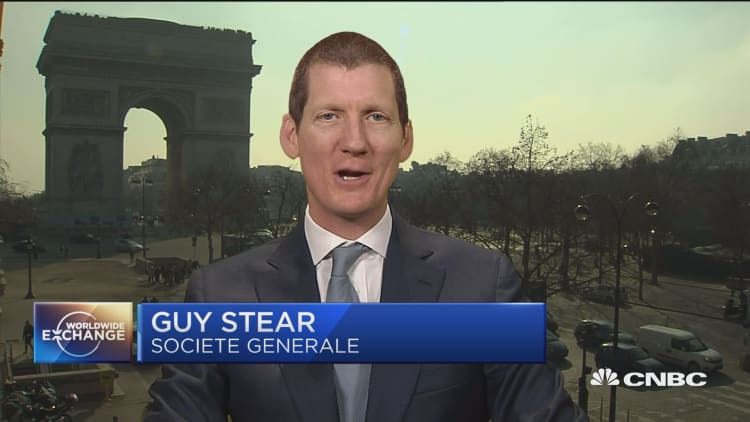Rising bond yields have triggered traders to automatically hit sell on the whole stock market lately on fears higher rates will drag on the whole economy. But they may be making a mistake. History shows certain stocks thrive when rates rise, while other stocks suffer badly.
The yield on the benchmark 10-year Treasury note has steadily crept higher over the past month to a four-year high and is hovering just below the key psychological level of 3 percent.
CNBC used hedge-fund tool Kensho to analyze which stocks have the highest correlation to the bond market and bond yields over the past six months.

Let's start with stocks that may win if the 10-year yield tops 3 percent.
Think of these Dow Jones industrial average stocks below as the "anti-bonds." These are the stocks that have a negative correlation with bond prices and therefore a positive correlation to rising bond yields. We used the iShares 20+ Year Treasury Bond exchange-traded fund (TLT) as our proxy for the bond market.
Stocks such as J.P. Morgan and Goldman Sachs tend to profit from higher rates, based on this rolling 6-month correlation.
Alternatively, the following Dow stocks have a positive correlation with bonds, meaning that rising rates tend to spell downside for investors.
Procter & Gamble and Coca-Cola, widely held for their attractive dividends, tend to fare worst in times of rising rates, this correlation study shows. Some investors may look at Treasurys to be a safer substitute for income as rates rise.
CNBC also evaluated how sectors in performed compared with bonds.
Industrial stocks are one of the "anti-bonds" sectors, with the most negative correlation with bond prices. The shares tend to outperform the broader market during accelerating economic growth that often accompanies rising rates.
Traditionally seen as a bond proxy, the utilities sector has a much stronger correlation with bond prices than other sectors, meaning that when yields rise, these stocks should suffer.
As CNBC's analysis would suggest, utilities are the worst-performing sector in the S&P 500 over the past six months, down more than 10 percent against the market's nearly 10.7 percent gain.
Disclosure: NBCUniversal, parent of CNBC, is a minority investor in Kensho.



